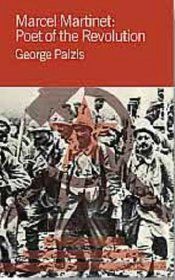Marcel Martinet was involved in avant-garde literary circles in France in the early part of the twentieth century and was later closely associated with the campaign against the first world war, not least through his collection of ferocious anti-war poems, Les Temps maudits. In the 1920s Martinet was literary editor of the Communist daily newspaper L’Humanité, and was influential in shaping the party’s relations with intellectuals and promoting working-class culture. He left the party in 1924 and became a relentless critic of Stalin’s influence on the revolutionary movement. Throughout his life he continued to write poetry, novels and plays. This book is the first dedicated to Martinet‘s life and work and contains many poems translated into English for the first time along with their French originals
"The central 100 or so pages of this book are taken up with a selection of Martinet's poems, printed here in both French and newly translated by the author. A first reading immediately suggests a politicised anger, very similar to Sassoon at his most agitated, as with his famous "Fight to a Finish" which closes: "I heard the Yellow-Pressmen grunt and squeal; / And with my trusty bombers turned and went / To clear those Junkers out of Parliament." It emerges from this book that in order to avoid the censors - or worse - Martinet published the poems in Switzerland, from where they were distributed as samizdat. Like Wilfred Owen or Ernst Friedrich in his book of photos War Against War, Martinet gives us the horrors of industrial warfare, piling up bodies and documenting horrific injuries. But he also wanted to express rage at the betrayal of the international socialist leaders who, he thought, could have united to prevent this carnage, and likewise at the clerics, "newspaper warriors" and learned professors who sell the war.
Martinet didn't see action - he was deemed to be not fit enough - so when he imagines the other side, it's not as another soldier, as with Owen's "Strange Meeting", but as a German poet who in parallel will be "weeping over our dead and yours". Then, as if expanding Sassoon's idea of turning the guns on his own leaders, Martinet pleads for some kind of revolutionary revenge."
from micheal rosen review in the guardian feb 2008
